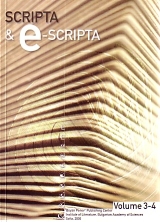Die byzantinischen Gesetze und ihre slavische übersetzung im Ersten Bulgarischen Reich
Byzantine Laws and their Slavonic Translation in the Time of First Bulgarian Kingdom
Author(s): Desislava NaydenovaSubject(s): Literary Texts
Published by: Институт за литература - БАН
Keywords: Byzantine legislative monuments; literature of First Bulgarian Kingdom; The Law to judge people; The Code of church laws of XIV Titul; Eclogue; The Prohiron
Summary/Abstract: The study is aimed at a specific moment from the Bulgarian history – the time from the Christianization (864) to the invasion of East Bulgaria by the emperor John Cimishiy (971). This period of the Bulgarian history gives the possibility to examine the phases of formation of a new cultural and political model in a newly converted to Christianity state: the Foundation of a state of an imperial type, which happens in almost all orthodox states, building their identity under the influence of Constantinople. Object of study are the following legislative monuments: The Law to judge people, The Code of church laws of XIV Titul, Eclogue, The Prohiron and the Agriculture law. The study poses two accents: 1. Sources and content of the canonic and judicial collections. The first group of problems the topic poses is connected with the clarification of the question of which judicial monuments existed in early medieval Bulgaria, entirely or their separate parts; what are their textological interrelations towards their Greek prototypes. 2. Meaning of the judicial monuments. In the First Bulgarian kingdom the translated Byzantine legislative monuments first of all play the part of a cultural (literary) testament and secondly, of real legislative acts. On the basis of the content of the juridical literature, in the article an attempt is made to clarify to what degree and how the Byzantine ideological and cultural models are copied and transformed with the purpose of: 1) accepting the newly converted to Christianity Bulgarian state within the framework of the Christian community; 2) the building, on the basis of Christianity, of a new concept of a state, nation and a ruler; 3) the regulation of the relations between the state (the ruler) and the Church.
Journal: Scripta & e-Scripta
- Issue Year: 2006
- Issue No: 3-4
- Page Range: 239-252
- Page Count: 14
- Language: German
- Content File-PDF

